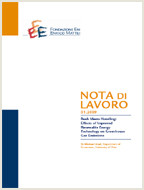The Strategic Use of Abatement by a Polluting Monopoly

30.08.2016
H23, L12, L51, Q52, Q55
Monopoly, Commitment, Emission Tax, Abatement, Stock Pollutant
Economic Theory and Applications
Carlo Carraro
This paper evaluates the effects of the lack of regulatory commitment on emission tax applied by the regulator, abatement effort made by the monopoly and social welfare comparing two alternative policy games. The first game assumes that the regulator commits to an ex-ante level of the emission tax. In the second one, in a first stage the regulator and the monopolist simultaneously choose the emission tax and abatement respectively, and in a second stage the monopolist selects the output level. We find that the lack of commitment leads to lower taxation and abatement that yield larger emissions and, consequently, a larger steady-state pollution stock. Moreover, the increase of environmental damages because of the increase in the pollution stock more than compensates the increase in consumer surplus and the decrease in abatement costs resulting in a reduction of social welfare. Thus, our analysis indicates that the lack of commitment has a negative impact of welfare although this detrimental effect decreases with abatement costs.
***
Suggested citation: Martín-Herrán, G., S. J. Rubio, (2016), ‘The Strategic Use of Abatement by a Polluting Monopoly’, Nota di Lavoro 58.2016, Milan, Italy: Fondazione Eni Enrico Mattei
